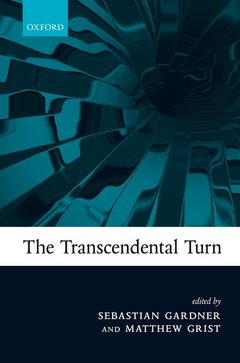The Transcendental Turn
Langue : Anglais
Coordonnateurs : Gardner Sebastian, Grist Matthew

Kant's influence on the history of philosophy is vast and protean. The transcendental turn denotes one of its most important forms, defined by the notion that Kant's deepest insight should not be identified with any specific epistemological or metaphysical doctrine, but rather concerns the fundamental standpoint and terms of reference of philosophical enquiry. To take the transcendental turn is not to endorse any of Kant's specific teachings, but to accept that the Copernican revolution announced in the Preface of the Critique of Pure Reason sets philosophy on a new footing and constitutes the proper starting point of philosophical reflection. The aim of this volume is to map the historical trajectory of transcendental philosophy and the major forms that it has taken. The contributions, from leading contemporary scholars, focus on the question of what the transcendental turn consists in--its motivation, justification, and implications; and the limitations and problems which it arguably confronts--with reference to the relevant major figures in modern philosophy, including Kant, Fichte, Hegel, Nietzsche, Husserl, Heidegger, Merleau-Ponty, and Wittgenstein. Central themes and topics discussed include the distinction of realism from idealism, the relation of transcendental to absolute idealism, the question of how transcendental conclusions stand in relation to (and whether they can be made compatible with) naturalism, the application of transcendental thought to foundational issues in ethics, and the problematic relation of phenomenology to transcendental enquiry.
Sebastian Gardner completed a doctorate on the philosophy of psychoanalysis at King's College Cambridge, under the supervision of Jim Hopkins, in 1987. For one year he held a Lectureship in the Department of Philosophy at Leicester University, and for two years was Lecturer and Director of Studies in Philosophy at St. Hilda's College. In 1989 he was appointed to a Lectureship in Philosophy at Birkbeck College, London, and then moved to University College London in 1998, where he became Professor of Philosophy in 2004. In 2002 he was Gastprofessor at the Institut für Philosophie, J. W. Goethe-Universität, Frankfurt/Main. His main research interests lie in Kant and German Idealism, and the legacy of classical German philosophy.; Matthew Grist works in the Cabinet Office, London.
Date de parution : 02-2015
Ouvrage de 392 p.
16.3x24 cm
© 2024 LAVOISIER S.A.S.



